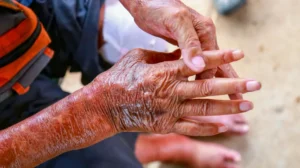Professor Femi Adelowo is West Africa’s first Professor of Rheumatology and a pioneer in the field with over five decades of experience in Medicine. In this exclusive interview with The Columnist NG’s Yusuf Mohammed to mark this year’s World Scleroderma Day, he sheds light on the numerous challenges faced in managing the disease, including late diagnosis, limited access to rheumatology specialists, lack of appropriate medications and the deep emotional toll of social isolation on patients. Excerpts:
The Columnist NG: What specialty of Medicine is called Rheumatology? And what is the relationship between Rheumatology and Scleroderma?
Prof. Adelowo: It is quite apt that we mark Scleroderma Day because it is a condition that affects many people and has a lot of impact on their lives; so it is important that we should know. First of all, Rheumatology is that specialty of internal medicine that deals with the non-traumatic diseases of the muscles, bones, joints; as well as these strange diseases due to the body’s immune (defence) system fighting the body, so called autoimmune diseases. That is in these diseases, there is no trauma involved. These diseases manifest as arthritis (when the bony structure of a joint is involved) and rheumatism (when the soft part of the joint is involved such as tendons, ligaments and muscles). And what is the musculoskeletal system? It is just the whole skeleton: the bones, and then the muscles and the joints. Various parts of our body, including our limbs move our body at the joints. The joints are the interface of two or more bones. There are numerous joints in the body which we use for moving, eating, breathing, reproduction and all other bodily functions.
The Columnist NG: What are autoimmune diseases?
Prof. Adelowo: For an understanding of autoimmune disease, it is essential to understand how the immune system (body’s defence system) of the body works. There are two types of immune systems in the body. The early response system called the Innate system and the back-up called Adaptive system. It is the latter that is involved in auto immune diseases. The two systems are ‘programmed’ not to attack the body in normal circumstances because they rely on’ pattern recognition’ and ‘tolerance’ of the protein constituents of cells of the body respectively. Why they will suddenly turn their ammunitions on the body is still not very clear. However various hypotheses have been suggested. Simplified, they are- 1)’ Our husband has gone mad again’ quoting the sage, late Ola Rotimi. The immune cells may suddenly go ‘crazy’ because of aging, drugs and infection thereby losing their ‘memory’ and are not able to recognise self again and like mad dogs, begin to attack self. 2). The immune system have within it some ‘area boy’ cells- autoreactive cells which are normally idling away, but in certain circumstances as in infection suddenly’ wake’ up and begin to attack the body 3)’ Friendly Fire’ theory- the immune cells sometimes in their bid to attack germs especially viruses mistake the body cells with the virus protein because of similarity in the protein-mimicry or mimicking 4) disturbed programmed cell deaths ‘apoptosis’ in which the dying cells of the body release some proteins which the immune system fails to recognise and thereby turn the ‘attack dogs’ on the body.
Autoimmune diseases are conditions in which the body’s immune (defence system) is fighting the body. Scleroderma (Systemic Sclerosis) is an example of an auto immune disease. It is a strange concept, but our body has a defence system called the immune system. This immune system is programmed to attack enemies. Germs are our greatest enemies and they abound all around us. We breathe in millions of germs, eat millions of germs, and some of them are even our neighbours on our skin, Staphylococcus. The immune system consists of cells, soluble chemicals (immunoglobulins), receptors. These cells and chemicals are present all over the body, in the mouth, trachea, bronchi. They ‘patrol’ all over the blood rounding up germs and killing them in ‘hand to hand’ combats or by means of chemical agents, just as in chemical warfare. The immune system also combats aberrant cells of the body when there is dysfunction of our normal cells, a process called mutation. Occasionally, the germs win in this continuous battle and we break down with infection, but the immune cells quickly rally round and with help of antibiotics they defeat the enemy (germs). The way these immune competent cells behave are reminiscent of the military with its various ammunitions and weapons, armoured tanks, battleships, jets! All programmed to attack the enemies in a coordinated unison!!
In auto immune diseases, some of these cells and chemicals go ‘rogue’ and rather than defending the body go ‘crazy’ and instead turn their ammunitions on the body causing inflammation and diseases. Auto immune diseases can occur in any part of the body from head to toe and any organ in the body including the brain, heart, lungs, kidneys, intestine, joints, skin and even the womb and others. Autoimmune diseases are not uncommon. They are mostly missed because of our poor understanding and the complexity of their presentations. One of those autoimmune diseases is what we call Scleroderma or Systemic Sclerosis. The specialist who is trained in the medical management of all autoimmune diseases is called a rheumatologist. He is also trained to manage all other diseases of the skeleton such as the muscles, bone and the joints.
The Columnist NG: Is Scleroderma also a connective tissue disease?
Prof. Adelowo: Yes, it is a connective tissue disease. And connective tissue is a simple term that means what connects different aspects of our body. For instance, our skin is connected to the underlying skeletal muscles. We have connective tissues in the heart, we have it in the muscles, and we have it in the lungs, intestines and others. Connective tissue is widespread in the body. Auto immune diseases have a predilection for connective tissues.
The Columnist NG: Apart from Scleroderma, are there other connective tissue diseases?
Prof. Adelowo: Yes, one of them is what we call systemic lupus erythematosus. It is one of the biggest challenges that we face as rheumatologists. And this particularly affects women in their child-bearing age and could affect many systems. We also have what we call inflammatory myopathies. In this case, the war is being fought in the muscles, either the muscles of the skeleton, or the muscles of the heart, or the muscles of the intestine.
Then you have a condition we call Sjogren’s Syndrome which is characterised by dryness in the mouth, dryness in the eyes, and dryness in every other part of the body. But whenever we talk of these connective tissues, one thing that is common to all of them is that they don’t just pick on one organ, they pick on every organ where connective tissues are.
There is also a condition we call anti-phospholipid syndrome, which in this case is characterised by patients having recurrent pregnancy losses or having small-for-age babies and recurrent clotting in the body. All these are connective tissue problems. But they are now more appropriately called Systemic Autoimmune Rheumatic Diseases to encompass more of these conditions. When we use this broader term of systemic autoimmune rheumatic diseases, we also refer to conditions like rheumatoid arthritis and arthritis in children (Juvenile Arthritis). In all, there are more than 100 of these conditions that are seen.
The Columnist NG: What are the specific organs that Scleroderma affects in the body?
Prof. Adelowo: Scleroderma starts from the skin because what’s going on in scleroderma, as an autoimmune disease, is that the antibodies causing this would attack structures in the skin, causing the laying down of exuberant scar tissue all over the body. So, the skin which is normally flexible and can ‘breathe’ is no longer able to do so because it is clogged up with scar tissue. Not external scar tissue you can see, but internal scar tissue. That skin becomes thick and hardened and cannot be pinched as in normal skin. The skin may also develop sores. The finger tips may change colours becoming pale, blue and red sequentially and associated with intense pain. This is what is known as Raynaud’s phenomenon.
But like other connective tissue diseases, scleroderma can affect other organs. It can affect the heart, causing difficulty with the heartbeat or even heart failure. It can cause accumulation of fluid around the heart, which can choke the heart. It affects the conducting system, the electrical system of the heart that transmits information in the chambers. It lays down fibrous tissue in the heart, causing irregular heartbeats and heart block.
It can affect the lungs by inflaming the lining (pleura), leading to what we call effusion. That effusion can compress the lungs and prevent expansion. It also affects the lung tissue, replacing normal tissue with scar tissue. The lungs become stiff and cannot t expand, this is called lung fibrosis.
It affects blood vessels too. For example, the pulmonary artery (which sends blood to the lungs). When affected, it leads to pulmonary hypertension and right side of the heart fails. It can affect the intestine; the muscles there become scarred and cannot expand. This leads to constipation, food accumulation, food regurgitation and ulcers. It affects the kidneys by damaging blood vessels that supply the kidneys, leading to kidney failure.
The Columnist NG: How can this condition be diagnosed and how can it be treated?
Prof. Adelowo: Rheumatologists and Dermatologists are trained to make diagnosis of this condition. One of the earliest signs is puffiness of the fingers. Then stiffness, because the tissues aren’t flexible. They also develop a peculiar symptom we call Raynaud’s phenomenon, where blood doesn’t flow well to the fingers.
In black scleroderma patients, we observe what we call a “salt and pepper” appearance: a mix of hyperpigmentation and depigmentation.
Another sign is hardening of the skin. You can’t pinch the skin because it’s plastered with scar tissue. It is most visible in the fingers. We will examine all the systems of the body and also carry out blood tests, antinuclear antibodies (ANA), anti-topoisomerase tests, Anti Centromere as well as scan of the chest, ECG, Echocardiography, lung spirometry and various other blood tests for the kidneys and other organs. We can also test part of the skin, biopsy.
We check lung function for fibrosis, check blood pressure in pulmonary arteries, assess the heart for irregular beats, and the digestive system for reflux or ulcers. When specific organs are involved, we bring in the relevant specialists (e.g., cardiologists for heart issues).
The Columnist NG: But first and foremost, it is the job of a rheumatologist, right?
Prof. Adelowo: Yes, it is.
The Columnist NG: Do we have enough rheumatologists to go around?
Prof. Adelowo: We made efforts to train many. I was Nigeria’s only rheumatologist for several years. In the past 20 years, however, we have trained over 50 specialists at LASUTH and LUTH, which are both accredited training centres. Our training is rigorous, it includes examinations, documentation, research and mandatory conferences. There are certifications of Fellow of West African College of Physicians (FWACP) and Fellow of National Postgraduate Medical College of Physicians (FMCP). On the average, it takes about 6-8 years of training, reading, practicing and numerous examinations after MB BS to be so certified
But many have left the country. That’s the current crisis, not just in Rheumatology but across the other specialties, unfortunately.
The Columnist NG: What is the treatment plan like, especially since there is no known cure yet?
Prof. Adelowo: Patients rarely see specialists early, often it takes 3 to 5 years. They are misdiagnosed, sent to orthopaedic surgeons, or told it’s a spiritual attack. Many go to herbal practitioners. By the time they reach a rheumatologist, years have passed.
We manage them with immunosuppressants, to calm the overactive immune system. But these drugs suppress good cells too, so careful monitoring is key. We are also increasingly using some special medications called Biological agents which target specific chemicals in the inflammation process
We treat reflux, kidney issues, ulcers, and other organ-specific complications. Globally, billions are spent on research. Some promising treatments include stem cell transplants and CAR T-cell therapies, though these are still experimental.
The Columnist NG: Is there hope for access to these new drugs?
Prof. Adelowo: Yes, but unfortunately, they are extremely expensive. Pharmaceutical companies are investing billions of dollars and would want to recoup their investment. Our patients pay mostly from their pockets and may not be able to pay for these effective treatments. Health insurance is a veritable solution
The Columnist NG: Are you satisfied with the level of awareness? And what do you say to those who discriminate against patients?
Prof. Adelowo: Our patients suffer from social isolation. Nigerians often attribute unfamiliar illnesses to witchcraft or ‘spiritual attack’. Even when doctors explain, many don’t listen. Unfortunately, the patients are rejected and some ignorant persons claim erroneously that it is leprosy!!
We should be working to change that mind-set with education. Events like this help. In the West, information is freely disseminated. Here, people still trust hearsay. Education is key. It is good to spend time with patients to explain the disease as well as give support as much as possible.
We are also educating our medical students and residents so they can make early diagnosis when they start practicing
The Columnist NG: Do you remember your first Scleroderma case?
Prof. Adelowo: Yes, at UCH, Ibadan in 1981. Her face was disfigured. She had been to prophets, herbalists, everywhere. She was socially isolated; her husband left. Then, we had no treatment options. Today, we know more and are better at management.
The Columnist NG: What is life expectancy for autoimmune diseases?
Prof. Adelowo: It has improved considerably. Today, 10-year survival is about 80–90%. That’s a huge improvement from the past. These improvements have been due to early recognition, more effective treatments, identifying contributory conditions (comorbidities). When I started my rheumatology training in 1980, it was much worse.
The Columnist NG: How would you assess the healthcare system over the past decade?
Prof. Adelowo: Many hospitals exist, but not necessarily better ones. Many are just structures, built for political points. No equipment, no electricity, no water, no accommodation for staff. That’s not how to run a hospital. The basics of a good hospital are well built and laid out solid structure (not one for the party ‘boys’), adequate and modern medical equipment (not refurbished, inferior qualities), unfailing electricity and water supply, maintenance of equipment, and experienced administrators.
The doctors who are supposed to work in these hospitals often don’t have hospital accommodations. If you don’t provide accommodation for them, how do you expect them to be available at night, especially given the current security challenges? Many hospitals traditionally include on-site accommodations for doctors to ensure their comfort and availability.
There must also be adequate pay for all hospital workers. All these will hopefully stem the bleeding of our health system by the ‘japa’ syndrome. It is also critical to have a good primary care system, well-built and equipped to cater for our people in the villages and towns. This will decrease the burden on our secondary and tertiary health care centres.
We must build hospitals as turn key projects, well built, well equipped and well administered by persons trained in hospital management. This is what is done in Saudi Arabia and Oman where I had previously worked.
Finally, I must thank and congratulate Elizabeth for putting up this programme. Like in most conditions, robust Patients Support Groups are essential. These groups are important in that patients are able to learn and get assurance from other sufferers of this condition. It also helps them to realise that their doctors understand their conditions are ever ready to support them. Dedicating a day to their condition by the World Health Organisation is also an assurance that they are not forgotten.




